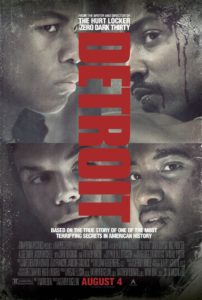
Detroit: When 1967 Meets 2017
When most people talk about the civil rights movement, they are usually referring to the work of activists to counter racism in the South. But African-Americans didn’t face injustice solely in the South; many large cities in the North were rife with discriminatory social policies that resulted in poverty and marginalization.
Sadly, racial discrimination and urban decay are still hot button issues today and have recently sparked violence across the country. Inspired by the recent unrest in Ferguson, MO (among other places), the film Detroit examines the Detroit riots and the subsequent Algiers Motel Incident that occurred 50 years ago, which unfortunately shows times may not have changed much. Directed by Oscar-winner, Katherine Bigelow, this film is an eye opening and often cringe-worthy look at a dark moment in our nation’s history.
The film takes place in the summer of 1967 when Motown may have peaked musically, but racial tensions were reaching a boiling point. The city of Detroit had just experienced several days of riots, looting and even threats of sniper attacks. At one point, gunshots were allegedly fired near a National Guard outpost, which resulted in the Detroit police and other law enforcement agencies descending on the nearby Algiers Hotel. Not finding a clear suspect, the cops took matters into their own hands, and began terrorizing a group of African-Americans who just happened to be at the scene of the alleged crime. Refusing to believe their claims of innocence, the police were determined to find the culprit who allegedly fired shots at law enforcement and utilize brutal tactics. Making matters worse, the National Guardsmen outside (who arrive to help), find out how brutally local police are handling the situation and turn their backs to avoid being linked with the controversy.
This film marks the third big screen collaboration from Bigelow and writer Mark Boal who use their trademark visceral storytelling style as they did in the acclaimed works, Zero Dark Thirty and The Hurt Locker. Although the script was short on backstory, many performances still stood out. John Boyega, who got his big break in 2015 with Star Wars: The Force Awakens was fitting in his role as a local security guard trying to ease tensions between the citizens and the police. Anthony Mackie (Captain America: Civil War, 2016), was also solid as a Vietnam veteran just looking for a job yet still subjected to police brutality. Will Poulter (Kids in Love, 2016) is excellent playing the merciless cop, Phillip Krauss, who has no qualms with abusing his powers to persecute black men as he sees fit. Algee Smith, who made his film debut, is a natural playing the innocent, aspiring performer, Larry. He’s a member of the up-and-coming R&B group, the Dramatics. Larry, who wants nothing more than to be signed by Motown, continually faces setbacks as he finds himself in deep trouble when he is found at the Algiers Motel. In what feels like a surprise cameo, John Krasinski has a small role as an attorney representing the racists cops. It might be because he was so popular on The Office, but it is still difficult seeing Krasinski playing a hate-able character.
In addition to the performances and direction, the set, wardrobe and overall style of the film were spot on for the era. While the film noted that it was based on a true story, it also did disclose that aspects were added for dramatic effect. Still, the actual events that occurred were brutal enough that it’s difficult to imagine they required much amplification. From a pacing perspective, the ending seemed a bit rushed as the majority of the film focused on the police interrogations, often at gunpoint. There is also very little character development, as noted above, so we do not get to know the characters’ motivations. Finally, the run time could have been condenses as there were certainly scenes where the message could have been delivered in half the time. Despite these flaws, the movie is an intense experience worthy of seeing.
Bottom Line: Although Detroit took place half a century ago, the injustice and violence are very much relatable today. Academy Award-winning director, Kathryn Bigelow, stuns audiences again, and while much can be attributed to the excellent, raw filmmaking, the storyline itself is harrowing enough. The film is worth a watch either on the big screen, or for a Friday night rental.
Credits: Written by Mark Boal; Directed by Kathryn Bigelow
Cast: John Boyega (Dismukes), Anthony Mackie (Greene), Will Poulter (Krauss), Algee Smith (Larry), Jacob Latimore (Fred), John Krasinski (Attorney Auerbach), Kaitlyn Dever (Karen), Hannah Murray (Julie)
Studio: Annapurna Pictures
Running Time: 142 minutes
Jessica DeLong © August 1, 2017
